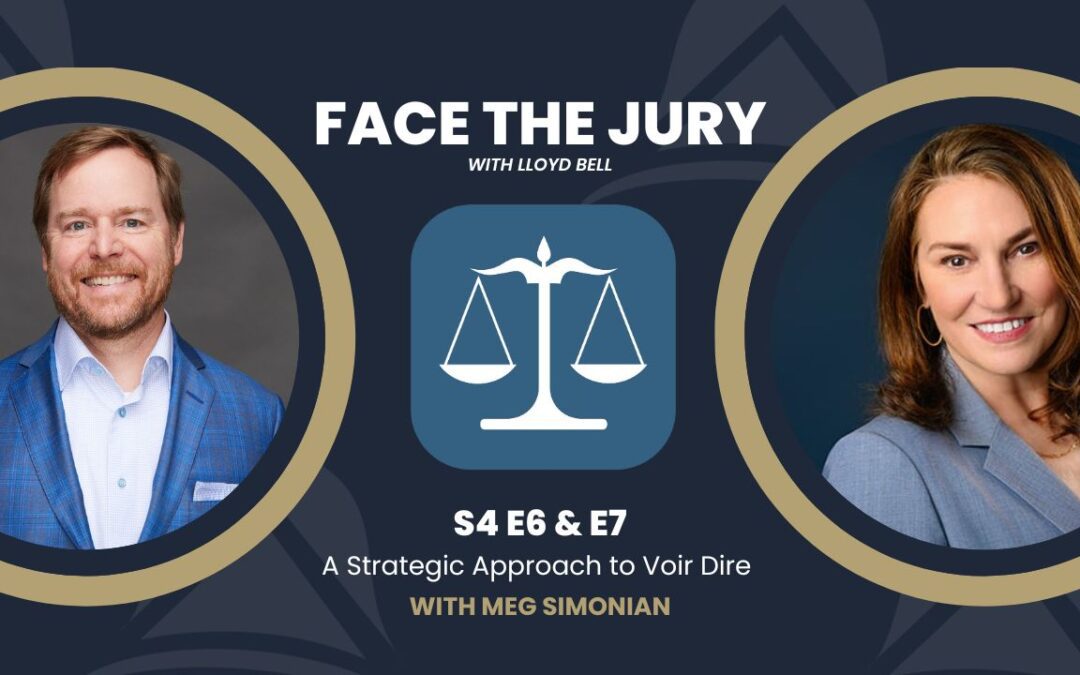In this two-part episode release of Face the Jury, Lloyd is joined by fellow trial attorney and Inner Circle of Advocates member Meg Simonian to discuss jury selection – or voir dire – strategies. Meg is one of Alaska’s top lawyers, devoting her practice to representing people who have been injured or wronged. In both parts one and two, she and Lloyd dive deep into the jury selection process, sharing essential questions to ask the jury during voir dire and more.
The “Simonian” Approach to Jury Selection
Meg shares highlights how voir dire is a critical part of trial preparation. This is the only time during a trial process when lawyers can speak to and ask jurors questions directly that can aid them in trial. During voir dire, Meg streamlines the process with a jury questionnaire, which helps identify jurors who could be biased toward either the plaintiff or defense, ultimately influencing the trial’s outcome.
While not every bias is bad, it’s still crucial to understand the beliefs and opinions of those sitting on the jury. The questionnaire helps Meg recognize people she may want to speak with more in-depth and even those she should be “afraid” of. These are jurors who may still have a bias no matter what you say, which can impede a fair trial process.
Here are the tips Meg shared for an effective jury selection process.
1. Elevate the Service
The process of interacting with potential jury members before trial helps Meg set the stage to build a sense of belonging amongst the group and establish cohesiveness in the jury through questioning. This cohesiveness is crucial for the jury to deliberate and reach a consensus effectively.
Additionally, Meg elevates the jurors’ sense of service by reminding them of their importance and the unique opportunity they have to bring value to a case that is important to her and her client. She asks the jury members why they showed up (despite court orderings) because she wants them to understand the weight they hold in this process and how the justice system relies on all of us to give everyone a fair chance.
2. Look for a Fair Fight
In jury selection, you are looking for a fair fight. Meg explains that this is your time to look for the right jurors who don’t have opinions or feelings that will blindly drive their decision but instead will give case evidence a fair evaluation. For medical malpractice cases, specifically, this means carefully screening potential jurors with any outside knowledge or strong opinions about medical care providers, hospitals or any related experiences that might influence their judgment unfairly.
For example, in a phlebotomy case, she may ask if anyone has had a negative experience getting blood drawn. Meg points out that it’s not uncommon for jurors who have endured similar experiences as the plaintiff to have a harsher judgment driven by their perceptions and outcomes. In her career, she has observed that people can be even more judgmental when they have a similar experience because people relate differently and understand situations based on their own lives and experiences.
3. Be Transparent and Honest
Meg stresses the importance of transparency and honesty in the voir dire process to establish a fair fight. By being upfront about the intentions and needs of the trial process, she builds credibility with the jury. This openness helps establish a relationship with jurors and sets the stage for a trial based on fairness rather than having anyone feel as though they are being manipulated.
4. De-Prioritize Sympathy
There is a clear distinction between empathy and sympathy in the courtroom, and Meg points this out to the jury. She explicitly tells jurors there is no place for sympathy for her client or the doctor because you can’t decide a case based on emotion. Jurors can’t let these feelings overshadow the evidence and use it to sway toward the plaintiff or defense, especially in medical malpractice cases.
Listen to parts one and two of Meg’s episode, and stay tuned for the next episode with our host, Lloyd Bell. Face the Jury is a podcast dedicated to confronting the issues involving medical malpractice in America– what it is, how to spot it and how to protect you and your family from medical negligence.

